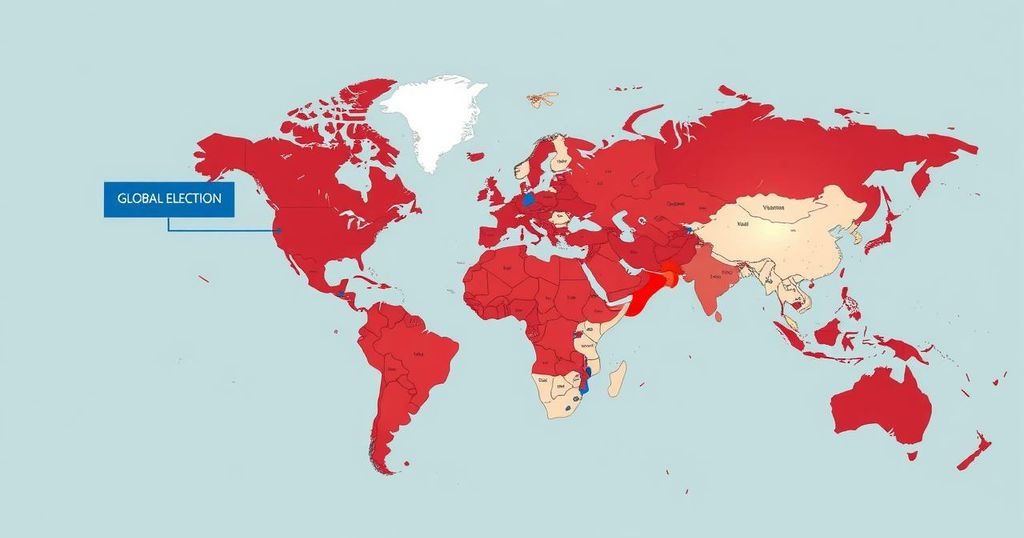In the tumultuous electoral year of 2024, global voters expressed widespread discontent with incumbent governments, resulting in significant political shifts across various countries. Economic instability and growing populist sentiments contributed to the rise of new leadership while traditional parties faced substantial losses. Allegations of foreign interference and growing support for extremist parties point to a precarious future for democracy as significant elections approach in 2025.
In 2024, elections across approximately 70 nations revealed a clear sentiment from voters: dissatisfaction with incumbents and a desire for change. Evidence of this shift included substantial electoral losses for ruling parties in countries such as South Africa, India, and the United Kingdom. Economic discontent, exacerbated by global crises and the lingering effects of the pandemic, fueled a trend of replacing long-standing governments with new, often populist, alternatives. The far-right also gained ground in various regions, complicating the political landscape and raising skepticism regarding the stability of democracy itself.
Political dynamics shifted markedly as voters from diverse regions rejected long-standing leadership. In South Africa, the African National Congress lost its grip, marking the end of a three-decade dominance. The Bharatiya Janata Party in India, led by Prime Minister Narendra Modi, experienced a surprising setback, losing its majority and leading to a coalition government. Similarly, the United Kingdom witnessed the Labour Party’s sweeping victory, further reflecting dwindling support for traditional party structures and the rise of alternative movements.
The global backdrop of economic difficulties, heightened by inflation and the repercussions of geopolitical conflicts, such as the war in Ukraine and unrest in the Middle East, contributed to pervasive unease among voters. This mood has been termed “electoral long COVID,” underscoring the compounded effects of health, economic, and social interruptions experienced during the pandemic.
Moreover, the electoral landscape in Europe revealed a tilt toward right-wing populism, with parties such as the National Rally in France and the Freedom Party in Austria making significant inroads, indicating a growing acceptance of extremist views amidst increased public discontent.
Concerns surrounding electoral integrity emerged prominently, as allegations of foreign interference heightened suspicions during electoral campaigns. Romanian elections were notably affected, prompting cancellations and controversy over external manipulation purportedly orchestrated by Russia.
The year concluded with the United States electing Donald Trump, whose second term raises questions about future international relations, leaving allies and adversaries alike in a state of anxiety. The instability characterized by various crises in nations such as South Korea and Mozambique signals a larger trend of disorder in the international political order, and democracy appears to be navigating a tumultuous path as it progresses into 2025.
Anticipated elections in countries like Canada and Germany further suggest that global political turbulence will persist, with notable polls indicating an enduring preference for democratic governance despite considerable disenchantment with current democratic practices. Michael Royster of the Stockholm-based International Institute for Democracy commented on this phenomenon, highlighting a disconnect between the appreciation of democratic ideals and the dissatisfaction with their practical implementation.
The article discusses the significant electoral changes observed across the globe in 2024, highlighting a distinct trend of voter discontent directed towards incumbent officials and parties. This discontent has been fueled by economic hardships, the aftereffects of the COVID-19 pandemic, and various geopolitical conflicts. The rise of far-right populism, alongside allegations of election interference, has complicated the global democratic landscape, leading to a growing skepticism regarding the effectiveness of existing political systems. As anticipation builds for upcoming elections in the following year, the narrative emphasizes a pivotal moment for democracy amidst ongoing instability.
The unfolding events of 2024 reflect a turbulent period in global politics, characterized by significant electoral shifts and widespread discontent with incumbents. Economic struggles, the impact of recent crises, and the emergence of far-right parties have all contributed to a sifting political landscape. As countries gear up for potential electoral battles in 2025, the challenges to democracy appear formidable, yet a strong desire for democratic governance remains amongst the populace. The interplay of dissatisfaction and the quest for effective representation will undoubtedly shape future political discourse and actions.
Original Source: www.clickorlando.com






